BMW 1 Series VS Toyota C-HR
BMW 1 Series
The BMW 1 Series stands out with its dynamic design that embodies both elegance and sportiness, making it an attractive choice for urban driving. Its interior offers a premium feel, combining quality materials with the latest in technological features to enhance comfort and connect drivers. Under the bonnet, a range of efficient engines ensures a responsive and enjoyable driving experience, balancing power with practicality.
detailsToyota C-HR
The Toyota C-HR stands out with its distinctive and bold design that combines sleek, angular lines with a sporty posture. Its comfortable and stylish interior is equipped with advanced technology features, providing a seamless driving experience. The vehicle offers impressive handling and performance, making it a compelling choice for those who appreciate a blend of practicality and flair on the road.
details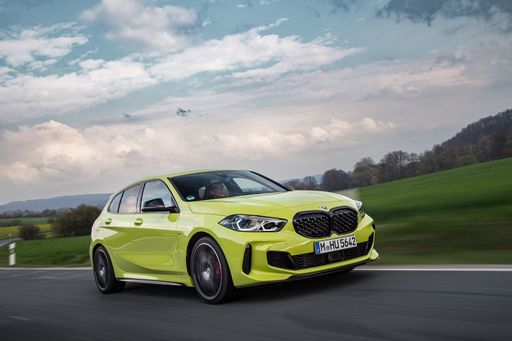 @ press.bmwgroup.com
@ press.bmwgroup.com
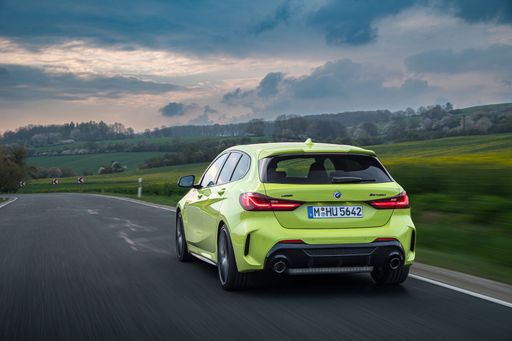 @ press.bmwgroup.com
@ press.bmwgroup.com
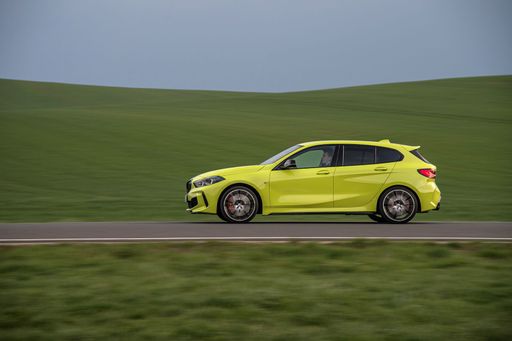 @ press.bmwgroup.com
@ press.bmwgroup.com
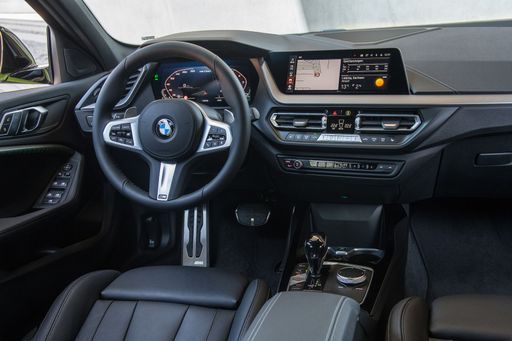 @ press.bmwgroup.com
@ press.bmwgroup.com
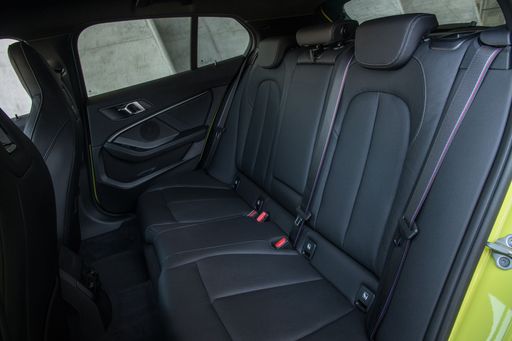 @ press.bmwgroup.com
@ press.bmwgroup.com
 @ Toyota
@ Toyota
 @ Toyota
@ Toyota
 @ Toyota
@ Toyota
 @ Toyota
@ Toyota
 @ Toyota
@ Toyota

|

|
|
|
|
Costs and Consumption |
|
|---|---|
|
Price
about 30400 - 55000
$
|
Price
about 32300 - 46200
$
|
|
Consumption L/100km
4.3 - 7.6
L
|
Consumption L/100km
0.8 - 5.1
L
|
|
Consumption kWh/100km
-
|
Consumption kWh/100km
-
|
|
Electric Range
-
|
Electric Range
67
km
|
|
Battery Capacity
-
|
Battery Capacity
-
|
|
co2
112 - 173
g/km
|
co2
19 - 115
g/km
|
|
Fuel tank capacity
49
L
|
Fuel tank capacity
43
L
|
Dimensions and Body |
|
|
Body Type
Hatchback
|
Body Type
SUV
|
|
Seats
5
|
Seats
5
|
|
Doors
5
|
Doors
5
|
|
Curb weight
1465 - 1625
kg
|
Curb weight
1505 - 1755
kg
|
|
Trunk capacity
300 - 380
L
|
Trunk capacity
350 - 447
L
|
|
Length
4361
mm
|
Length
4362
mm
|
|
Width
1800
mm
|
Width
1832
mm
|
|
Height
1459
mm
|
Height
1558 - 1564
mm
|
|
Payload
475 - 510
kg
|
Payload
375 - 425
kg
|
Engine and Performance |
|
|
Engine Type
Diesel, Petrol MHEV, Diesel MHEV, Petrol
|
Engine Type
Full Hybrid, Plugin Hybrid
|
|
Transmission
Automatic
|
Transmission
Automatic
|
|
Transmission Detail
Automat. Schaltgetriebe (Doppelkupplung)
|
Transmission Detail
CVT
|
|
Drive Type
Front-Wheel Drive, All-Wheel Drive
|
Drive Type
Front-Wheel Drive, All-Wheel Drive
|
|
Power HP
122 - 300
HP
|
Power HP
140 - 223
HP
|
|
Acceleration 0-100km/h
4.9 - 9.8
s
|
Acceleration 0-100km/h
7.4 - 9.9
s
|
|
Max Speed
210 - 250
km/h
|
Max Speed
175 - 180
km/h
|
|
Torque
230 - 400
Nm
|
Torque
-
|
|
Number of Cylinders
3 - 4
|
Number of Cylinders
4
|
|
Power kW
90 - 221
kW
|
Power kW
103 - 164
kW
|
|
Engine capacity
1499 - 1998
cm3
|
Engine capacity
1798 - 1987
cm3
|
|
Top speed
210 - 250
km/h
|
Top speed
175 - 180
km/h
|
General |
|
|
Model Year
2024
|
Model Year
2024
|
|
CO2 Efficiency Class
D, C, F
|
CO2 Efficiency Class
C, B
|
|
Brand
BMW
|
Brand
Toyota
|
BMW 1 Series
Exploring the BMW 1 Series: A Compact Powerhouse
The latest iteration of the BMW 1 Series continues to set the benchmark for premium compact cars, blending cutting-edge technology and efficient performance. Known for its sporty design and responsive driving dynamics, the BMW 1 Series offers a range of options that cater to varied preferences and needs. Let’s delve into the technical details and innovations that make this vehicle a standout in its class.
Advanced Engine Variants and Performance
Under the hood, the BMW 1 Series offers a varied selection of powertrains, including diesel, petrol mild-hybrid, and pure petrol options. Power outputs range from 150 to an impressive 300 PS, allowing drivers to opt for either efficiency or sheer performance. The utilisation of mild-hybrid technology in some variants ensures a smooth and efficient drive, with increased torque available for dynamic acceleration.
All models come equipped with an Automatic Transmission, more specifically, a double-clutch gearbox for seamless gear transitions, offering a responsive drive whether you're navigating city streets or the open road. The top-of-the-line M135 variant boasts all-wheel drive capability, enhancing traction and control even further.
Efficient and Sustainable Driving
The BMW 1 Series is engineered for efficiency, achieving fuel consumption as low as 4.3 litres per 100 km in some diesel variants, while the petrol models also demonstrate competitive efficiency ratings. In terms of emissions, the range offers CO2 output figures between 112 to 173 g/km, garnering respectable CO2-efficiency ratings. Additionally, the mild-hybrid variants benefit from regenerative braking, which captures energy usually lost during braking and uses it to power the vehicle.
Innovative Technology and Comfort
Step inside the BMW 1 Series and you'll find a driver-focused cockpit outfitted with the latest in automotive technology. The infotainment system is hosted on a high-resolution display, providing easy access to navigation, entertainment, and vehicle settings. Key features like smartphone integration and voice control enhance the connectivity options available, creating a seamless link between driver and machine.
On the comfort front, the BMW 1 Series provides a refined interior experience, with high-quality materials and finishes. There's generous space for up to five passengers, alongside a versatile boot capacity that ranges from 300 to 380 litres, accommodating both daily errands and weekend getaways.
Design and Dimensions
The exterior design of the BMW 1 Series showcases its sporty lineage with a compact and agile silhouette. Measuring 4361 mm in length and 1800 mm in width, it maintains a confident road stance, while its height of 1459 mm contributes to a sleek, aerodynamic profile. Furthermore, the 1 Series is available in several stylistic options, providing aesthetics that can be customised to personal preference, including M Sport packages that introduce more aggressive styling cues.
Conclusion: A Harmony of Performance and Comfort
The BMW 1 Series deftly balances performance, efficiency, and comfort, making it a compelling choice for those in the market for a premium compact car. With its range of powerful engines, state-of-the-art technology, and stylish design, the BMW 1 Series remains a leader in its segment. Whether you prioritise sporty performance or efficient urban commuting, the 1 Series is equipped to deliver beyond expectations.
Toyota C-HR
Revolutionising the Crossover Segment: The Toyota C-HR
The Toyota C-HR has firmly established itself as a standout contender in the compact crossover segment. Known for its distinct design and hybrid capabilities, the C-HR continues to prioritise innovation and efficiency. In this article, we delve into the technical details that make the 2024 iteration a compelling choice for discerning buyers.
Distinctive Design and Aerodynamics
The Toyota C-HR boasts a striking design that combines angular lines with modern aesthetics. This isn't merely for show; the design enhances aerodynamics, improving fuel efficiency and handling. With dimensions of 4362mm in length and a sophisticated structure, the C-HR strikes a balance between urban agility and on-road stability.
Impressive Hybrid Powertrains
The C-HR lineup offers innovative hybrid and plug-in hybrid drivetrain options. The full hybrid system is tailored for those who seek both economic and environmental benefits. It combines a petrol engine with an electric motor to deliver power outputs ranging from 140 to 223 PS, achieving remarkable fuel consumption rates from 0.8 to 5.1 L/100km. The 2.0 Plug-In Hybrid variant impresses with an electric range of 67 km, ideal for urban commuters.
Unmatched Efficiency and Performance
Acceleration figures for the C-HR range from 7.4 to 9.9 seconds to reach 0-100 km/h, ensuring a responsive driving experience. Maximum speeds between 175 and 180 km/h cater to those who appreciate a bit of zest on the open road. Coupled with CVT automatic transmission and both front-wheel and all-wheel-drive configurations, the C-HR adapts to various driving conditions with ease.
Advanced Technology and Features
Inside, the C-HR is equipped with the latest technology aimed at providing connectivity and comfort. The model hosts an array of features across its diverse trim levels, including Business Edition, Lounge, and the sporty GR SPORT. Each variant is designed to meet the demands of different lifestyles, ensuring there's a C-HR model to suit every taste.
Sustainability and Cost Efficiency
With CO2 emissions ranging from 19 to 115 g/km, the C-HR stands as a testament to Toyota's commitment to sustainability. Financially savvy consumers will also appreciate the running cost, with monthly expenses from €959 to €1204, and a cost per km as low as 38.4 cents. Such efficiency makes the vehicle an attractive option for eco-minded buyers.
Conclusion: A Forward-Thinking Choice
The 2024 Toyota C-HR embodies Toyota's forward-thinking approach to automotive innovation, blending eco-friendly hybrid technologies with stylish design and practicality. It offers a glimpse into the future of driving, where efficiency meets elegance. Whether you're a city dweller or an adventure seeker, the C-HR promises a driving experience that is both enjoyable and environmentally conscious.
